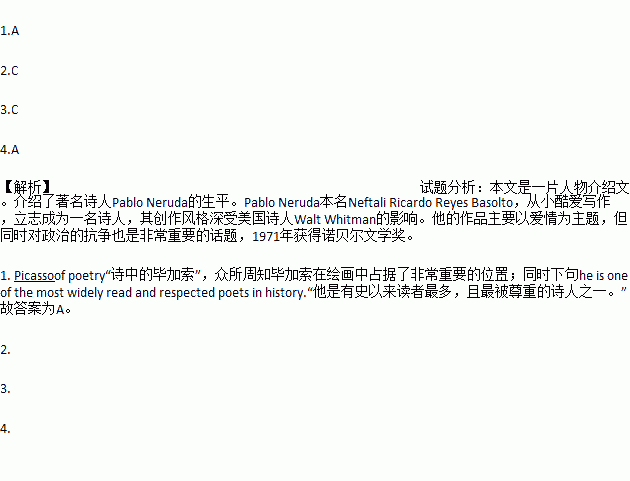题目内容
He was once referred to as the Picasso of poetry. Beloved by Chileans of all classes, he is one of the most widely read and respected poets in history. And this year is the 100th birthday of Pablo Neruda (1904-1973).
Born with the name Neftali Ricardo Reyes Basolto, he was a tall, shy and lonely boy. He loved to read and started to write poetry when he was ten. The American poet Walt Whitman, whose framed picture Neruda later kept on his table, became a major influence on his work.
However, his father did not like the idea of having a poet for a son and tried to discourage him from writing. To cover up the publication of his first poem, he took the pen name Pablo Neruda.
In 1924 Neruda gained fame with his most widely read work “Twenty Love Poems and a Song of Despair’’. Yet his rich experience as a diplomat and exile made him go beyond the theme of love. His work also reflected the political struggle of the left and development of South America. He was awarded the Nobel Prize for Literature in 1971.
Neruda loved the sea which he saw as creative, destructive and forever moving. He found inspiration in the power and freedom of the waves and the seabirds on the coast. “I need the sea because it teaches me,” he wrote. “I move in the university of the waves.” He loved how the sea forever renewed itself, a renewal echoed in his work.
1.The underlined word “Picasso” can probably be replaced by “________”.
A. most important person B. famous person from Picasso
C. freedom fighter in Picasso D. poem fan
2.Neftali Ricardo Reyes Basolto took the pen name Pablo Neruda because ________.
A. literary greats usually used the pen name
B. his father encouraged him to use the name
C. he wanted to prevent his father knowing the publication
D. he was greatly influenced by other poets
3.Which of the following is not the theme of his works?
A. Love. B. Political struggle.
C. Social reform. D. Development of South America.
4.The last paragraph mainly tells us ________.
A. the sea gave Neruda vast writing inspiration
B. the beautiful scenery along the Chile coast
C. Neruda’s poems were widely read overseas
D. Neruda loved to write his poems near the sea
 阅读快车系列答案
阅读快车系列答案
